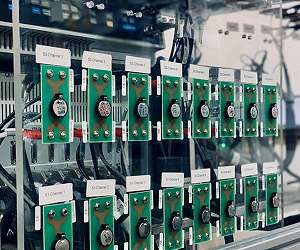Researchers have successfully increased the lifespan and stability of solid-state lithium-ion batteries, creating a viable approach for future widespread usage.
The strength of the new, high-density batteries produced by the University of Surrey means that they are less likely to short-circuit – a problem found in previous lithium-ion solid-state batteries.
Dr Yunlong Zhao from the Advanced Technology Institute, the University of Surrey, explained: “We have all heard horror stories of lithium-ion batteries in transport settings, usually down to issues around cracked casing caused by exposure to stressful environments, such as extreme temperature changes. Our research proves that it is possible to produce more robust solid-state lithium-ion batteries, which should provide a promising approach for high-energy and safe future models to be used in real-life examples such as electric vehicles.”
Using the state-of-the-art national facility at Surrey’s Ion Beam Centre, the small team injected Xenon ions into a ceramic oxide material to create a solid-state electrolyte. The team found that their method created a battery electrolyte that showed a 30-times improvement in lifespan over a battery that had not been injected.
Dr Nianhua Peng, co-author of the study from the University of Surrey, said: “We are living in a world that is far more aware of the damage humans are causing to the environment. We hope that our battery and approach will help boost the scientific development of high-energy batteries to eventually move us into a more sustainable future.”
The University of Surrey is a leading research institution that focuses on sustainability to the benefit of society in order to deal with the many challenges of climate change. It is also committed to improving its own resource efficiency on its estate and being a sector leader.
It has set a commitment to be carbon neutral by 2030. In April, it was ranked 55th in the world by the Times Higher Education (THE) University Impact Rankings which assesses more than 1,400 universities’ performance against the United Nations’ Sustainable Development Goals (SDGs).
The full paper published in Small was led by Dr Yunlong Zhao and Dr Nianhua Peng from the Advanced Technology Institute and UK National Ion Beam Centre using the University of Surrey’s Ion Beam Centre and can be accessed here
Research Report:Xenon Ion Implantation Induced Surface Compressive Stress for Preventing Dendrite Penetration in Solid-State Electrolytes
Related Links
University of Surrey
Powering The World in the 21st Century at Energy-Daily.com
|
We need your help. The SpaceDaily news network continues to grow but revenues have never been harder to maintain. With the rise of Ad Blockers, and Facebook – our traditional revenue sources via quality network advertising continues to decline. And unlike so many other news sites, we don’t have a paywall – with those annoying usernames and passwords. Our news coverage takes time and effort to publish 365 days a year. If you find our news sites informative and useful then please consider becoming a regular supporter or for now make a one off contribution. |
||
|
SpaceDaily Contributor $5 Billed Once credit card or paypal |
SpaceDaily Monthly Supporter $5 Billed Monthly paypal only |
|

![]()
Novel strategy to make fast-charging solid-state batteries
Bengaluru, India (SPX) Jun 03, 2022
In a breakthrough, researchers at the Indian Institute of Science (IISc) and their collaborators have discovered how next-generation solid-state batteries fail and devised a novel strategy to make these batteries last longer and charge faster.
Solid-state batteries are poised to replace the lithium-ion batteries found in almost every portable electronic device. But on repeated or excessive use, they develop thin filaments called ‘dendrites’ which can short-circuit the batteries and render them use … read more
